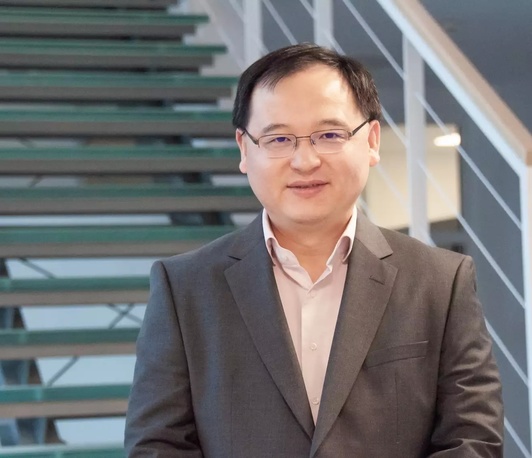MPI Kolloquiumsreihe Prof. Xinliang Feng, MPI für Mikrostrukturphysik: Beyond Layers: Unveiling the Potential of Organic 2D Crystals in Emerging Material Science
MPI Kolloquiumsreihe Prof. Xinliang Feng, MPI für Mikrostrukturphysik
- Datum: 07.03.2024
- Uhrzeit: 14:00 - 16:00
- Vortragende(r): Prof. Xinliang Feng
- Direktor, Max-Planck-Institut für Mikrostrukturphysik, Halle/Saale
- Ort: Max-Planck-Institut Magdeburg
- Raum: Großer Seminarraum "Prigogine"
- Gastgeber: MPI Forschungskoordination
- Kontakt: oelbermann@mpi-magdeburg.mpg.de

Das Max-Planck-Institut Magdeburg lädt Sie herzlich zu seiner öffentlichen Kolloquiumsreihe ein.
Hochrangige WissenschaftlerInnen verschiedener Fachgebiete aus renommierten Forschungseinrichtungen aus Deutschland und weltweit präsentieren ihre Forschungsarbeit.
Einwahl per Zoom: https://eu02web.zoom-x.de/j/7302508065
Abstract
Organic 2D crystals with extended conjugation have emerged as a distinctive class of layered materials characterized by unique electronic structures and exotic physicochemical phenomena, with significant application potential. A widely employed approach for synthetic access to these precision materials is bottom-up synthesis. This encompasses the creation of single-layer to few-layer 2D polymers/supramolecular polymers, 2D conjugated polymers or covalent-organic frameworks, and 2D conjugated metal-organic frameworks. A key chemical challenge is to achieve controlled 2D polymerization in two distinctive directions under thermodynamic/kinetic control in solution, in the solid state, or at the surface/interface. In the first part of my talk, I will present novel 2D polymerization methods together with design strategies aimed at achieving efficient 2D conjugation in specific 2D conjugated polymers, such as 2D poly(arylenevinylene)s and 2D poly(benzimidazobenzophenanthroline)-ladder-type structures. These 2D conjugated polymers provide a material platform for realizing high intrinsic carrier mobilities, which is crucial for opto-electronics and spintronics. In the second part of the talk, I will discuss on-water surface chemistry as a potent synthetic platform for organic 2D crystals and their van der Waals heterostructures, leveraging water-surface confinement and enhanced chemical reactivity and selectivity. A major focus will be on the surfactant-monolayer-assisted interfacial synthesis (SMAIS) method, which is now known for its high efficiency in the programmable arrangement of precursor monomers on the water surface and subsequent controlled 1D/2D polymerization. The distinct 2D crystal structures that offer tailorable conjugated building blocks and conjugation lengths, tunable pore sizes and thicknesses, and remarkable electronic structures, make these materials highly promising for various applications in electronics, optoelectronics, and spintronics. Other physicochemical phenomena and application potential of organic 2D crystals, such as in membranes and energy devices, will also be discussed.
Über den Sprecher (Website)
Prof. Feng is a Director at the Max Planck Institute of Microstructure Physics and Head of the Chair of Molecular Functional Materials at Technische Universität Dresden. His current scientific interests include synthetic methodology for new-type polymers, organic and polymer synthesis, interfacial chemistry, supramolecular chemistry of π-conjugated system, bottom-up synthesis of carbon nanostructures and graphene nanoribbons, 2D polymers and supramolecular polymers, 2D carbon-rich conjugated polymers for opto-electronics and spintronics, electrochemical exfoliation of 2D crystals, graphene and 2D materials for energy storage and conversion, new energy devices and technologies. He published more than 700 research articles, attracting >100.000 citations with an H-index of 164 (Google Scholar).
He was awarded several prestigious prizes such as the IUPAC Prize for Young Chemists (2009), European Research Council (ERC) Starting Grant Award (2012), Journal of Materials Chemistry Lectureship Award (2013), ChemComm Emerging Investigator Lectureship (2014), Fellow of the Royal Society of Chemistry (FRSC, 2014), Highly Cited Researcher (Thomson Reuters, 2014-2021), Small Young Innovator Award (2017), Hamburg Science Award (2017), EU-40 Materials Prize (2018), ERC Consolidator Grant Award (2018). He is a member of the European Academy of Sciences (2019), member of the Academia Europaea (2019), and member of the German Academy of Science and Engineering (acatech, 2021). He is an Advisory Board Member for Advanced Materials, Chemical Science, Journal of Materials Chemistry A, ChemNanoMat, Energy Storage Materials, Small Methods, Chemistry -An Asian Journal, Trends in Chemistry, etc. He is Head of the ESF Young Research Group "Graphene Center Dresden", Working Package Leader of WP Functional Foams & Coatings for European Commission’s pilot project “Graphene Flagship”, and spokesperson for the DFG Collaborative Research Center for the Chemistry of Synthetic 2D Materials (2020-).